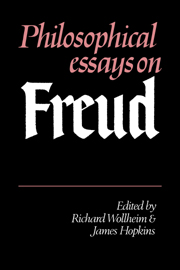Book contents
- Frontmatter
- Contents
- Introduction: philosophy and psychoanalysis
- 1 Conversations on Freud; excerpt from 1932–3 lectures
- 2 Freud, Kepler, and the clinical evidence
- 3 Critical empiricism criticized: the case of Freud
- 4 Freudian commonsense
- 5 Disposition and memory
- 6 On Freud's doctrine of emotions
- 7 The id and the thinking process
- 8 The bodily ego
- 9 Norms and the normal
- 10 On the generation and classification of defence mechanisms
- 11 Models of repression
- 12 Mauvaise foi and the unconscious
- 13 Self-deception and the ‘splitting of the ego’
- 14 Freud's anthropomorphism
- 15 Freud's anatomies of the self
- 16 Motivated irrationality, Freudian theory and cognitive dissonance
- 17 Paradoxes of irrationality
- Works of Freud cited
- Select bibliography
Introduction: philosophy and psychoanalysis
Published online by Cambridge University Press: 01 October 2009
- Frontmatter
- Contents
- Introduction: philosophy and psychoanalysis
- 1 Conversations on Freud; excerpt from 1932–3 lectures
- 2 Freud, Kepler, and the clinical evidence
- 3 Critical empiricism criticized: the case of Freud
- 4 Freudian commonsense
- 5 Disposition and memory
- 6 On Freud's doctrine of emotions
- 7 The id and the thinking process
- 8 The bodily ego
- 9 Norms and the normal
- 10 On the generation and classification of defence mechanisms
- 11 Models of repression
- 12 Mauvaise foi and the unconscious
- 13 Self-deception and the ‘splitting of the ego’
- 14 Freud's anthropomorphism
- 15 Freud's anatomies of the self
- 16 Motivated irrationality, Freudian theory and cognitive dissonance
- 17 Paradoxes of irrationality
- Works of Freud cited
- Select bibliography
Summary
The essays in this volume are about philosophical issues arising from the work of Freud. They differ in approach and opinion, although most are written in the tradition of analytical philosophy. Readers who lack familiarity with psychoanalysis or philosophical discussion of it may find it useful to be given some perspective on the issues involved, and some indication as to how they are connected with one another. This introduction, therefore, consists of two parts. The first describes one of the most widely discussed topics from the encounter between analytical philosophy and psychoanalysis, and considers its bearing upon the exegesis and verification of Freudian theory. The second comments briefly on the essays, relating them to the issues described.
Philosophy aims, among other things, at clarity of understanding and the demarcation of knowledge. These aims are linked in the philosophical consideration of theories used in explanation; for a correct understanding of the nature of a theory may be required for judging how far explanations using that theory contribute to knowledge. Clarity of this sort about psychoanalytic theory has, it seems, been difficult to attain. In particular, the relation of Freud's explanations to those in physical or experimental science has long been a matter of dispute. Recently this dispute has taken a particular form.
- Type
- Chapter
- Information
- Philosophical Essays on Freud , pp. vii - xlviPublisher: Cambridge University PressPrint publication year: 1982
- 10
- Cited by



